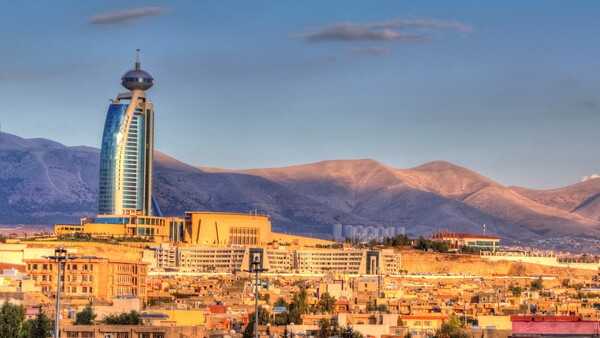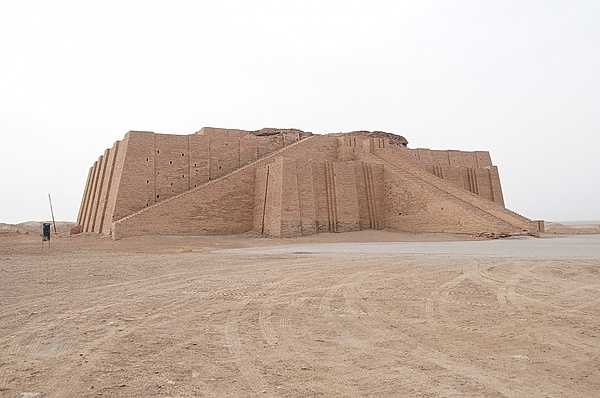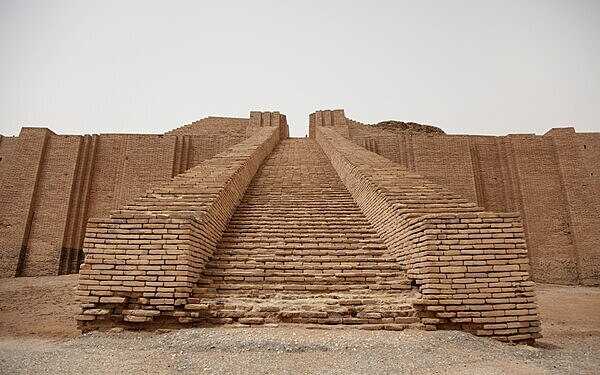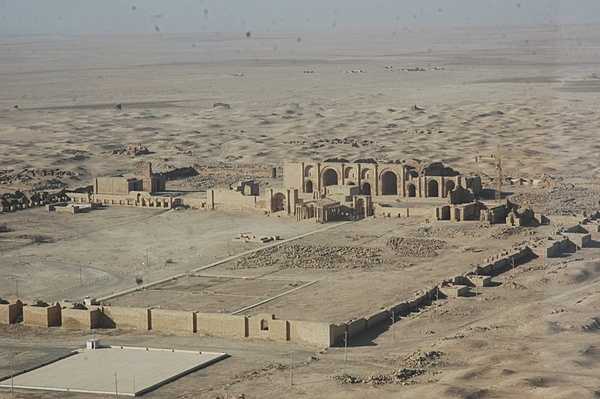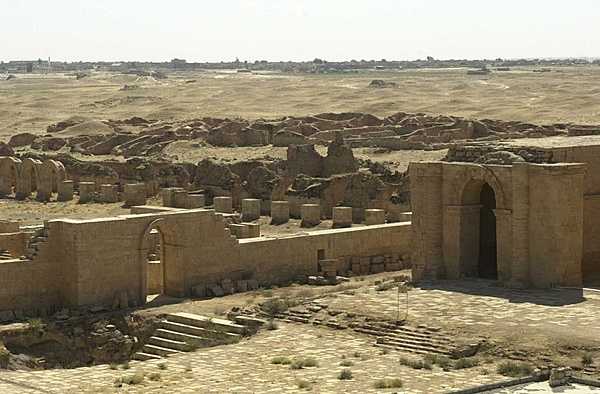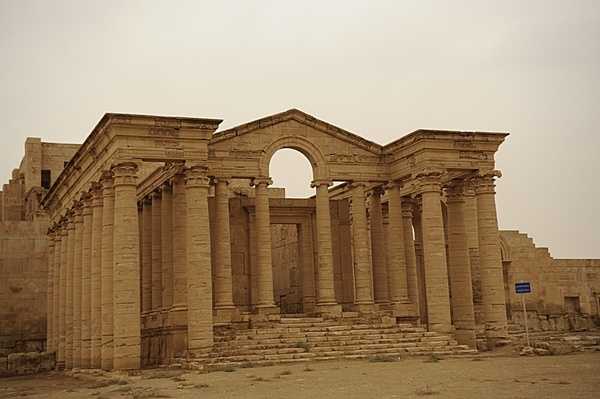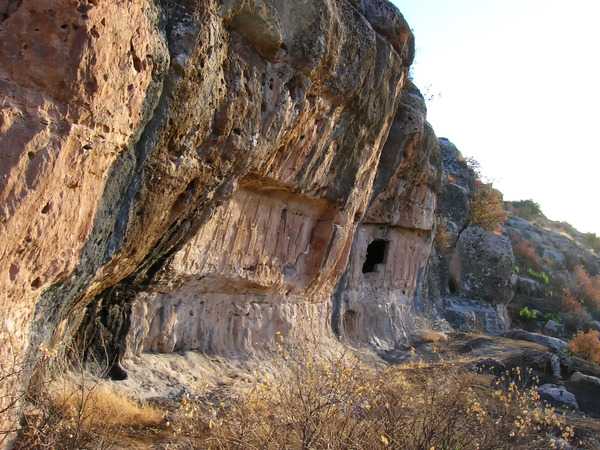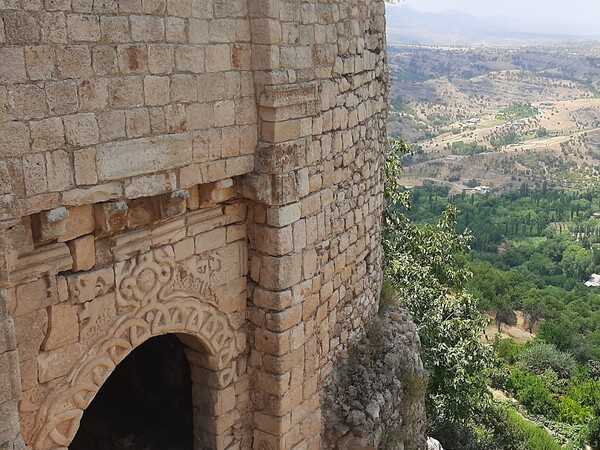Iraq - IQ - IRQ - IRQ - Middle East
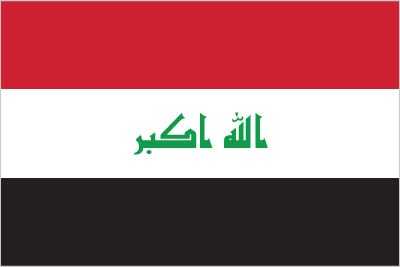
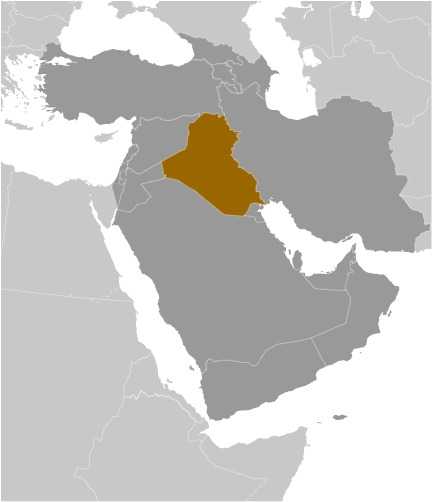
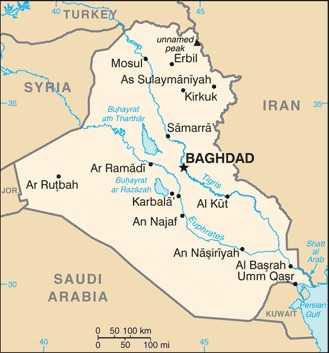
Iraq Images
Iraq Factbook Data
Diplomatic representation from the US
embassy: Al-Kindi Street, International Zone, Baghdad; note - consulate in Al Basrah closed as of 28 September 2018
mailing address: 6060 Baghdad Place, Washington DC 20521-6060
telephone: 0760-030-3000
email address and website:
BaghdadACS@state.gov
https://iq.usembassy.gov/
Age structure
15-64 years: 61.7% (male 13,064,516/female 12,907,702)
65 years and over: 3.6% (2024 est.) (male 681,574/female 851,495)
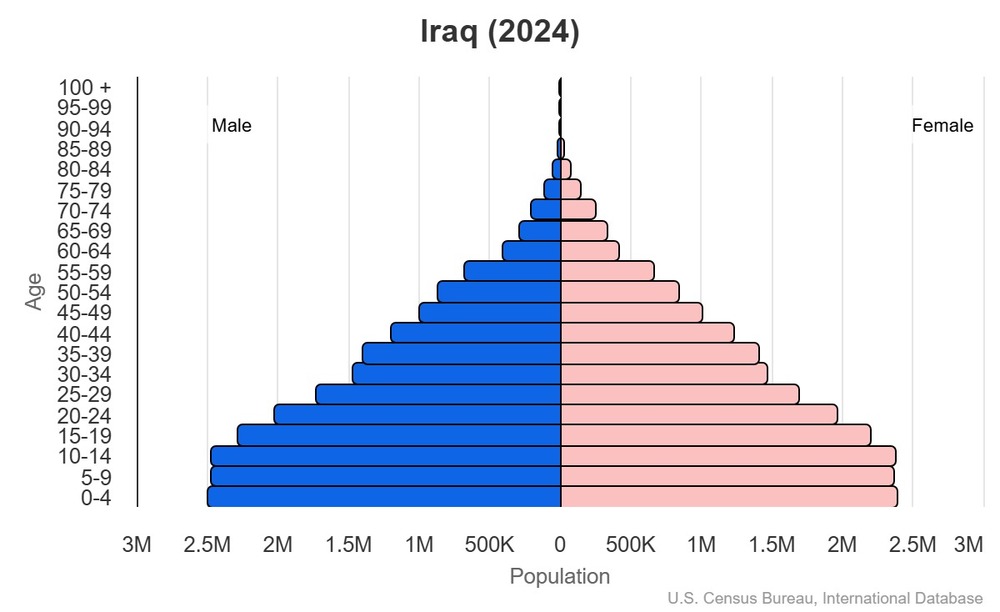
For additional information, please see the entry for Population pyramid on the Definitions and Notes page.
Geographic coordinates
Sex ratio
0-14 years: 1.04 male(s)/female
15-64 years: 1.01 male(s)/female
65 years and over: 0.8 male(s)/female
total population: 1.02 male(s)/female (2024 est.)
Natural hazards
Area - comparative
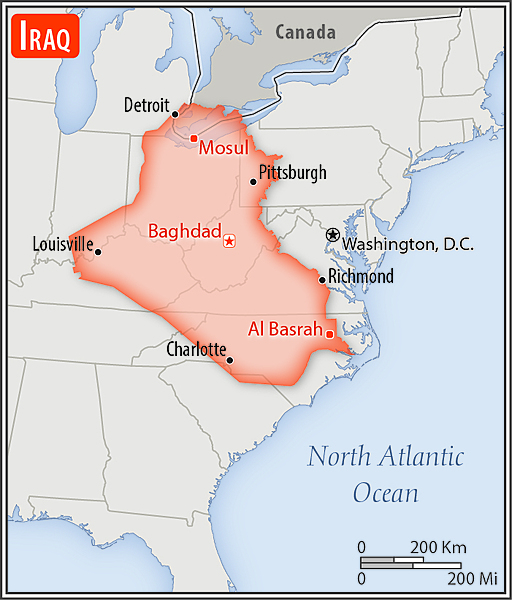
slightly more than three times the size of New York state
Military service age and obligation
Background
Formerly part of the Ottoman Empire, Iraq was occupied by the United Kingdom during World War I and was declared a League of Nations mandate under UK administration in 1920. Iraq attained its independence as a kingdom in 1932. It was proclaimed a republic in 1958 after a coup overthrew the monarchy, but in actuality, a series of strongmen ruled the country until 2003. The last was SADDAM Hussein, from 1979 to 2003. Territorial disputes with Iran led to an inconclusive and costly war from 1980 to 1988. In 1990, Iraq seized Kuwait but was expelled by US-led UN coalition forces during the two-month-long Gulf War of 1991. After Iraq's expulsion, the UN Security Council (UNSC) required Iraq to scrap all weapons of mass destruction and long-range missiles and to allow UN verification inspections. Continued Iraqi noncompliance with UNSC resolutions led to the Second Gulf War in 2003, when US-led forces ousted the SADDAM regime.
In 2005, Iraqis approved a constitution in a national referendum and elected a 275-member Council of Representatives (COR). The COR approved most of the cabinet ministers, marking the transition to Iraq's first constitutional government in nearly a half-century. Iraq's constitution also established the Kurdistan Regional Government (KRG), a semi-autonomous region that administers the governorates of Erbil, Dahuk, and As Sulaymaniyah. Iraq has held four national legislative elections since 2006, most recently in 2021. The COR approved Mohammad Shia' al-SUDANI as prime minister in 2022. Iraq has repeatedly postponed elections for provincial councils -- last held in 2013 -- and since 2019, the prime minister has had the authority to appoint governors rather than provincial councils.
Between 2014 and 2017, Iraq fought a military campaign against the Islamic State of Iraq and ash-Sham (ISIS) to recapture territory the group seized in 2014. In 2017, then-Prime Minister Haydar al-ABADI publicly declared victory against ISIS, although military operations against the group continue in rural areas. Also in 2017, Baghdad forcefully seized disputed territories across central and northern Iraq from the KRG, after a non-binding Kurdish independence referendum.
Environmental issues
International environmental agreements
signed, but not ratified: Climate Change-Paris Agreement, Environmental Modification
Military expenditures
2.5% of GDP (2023 est.)
1.8% of GDP (2022 est.)
3% of GDP (2021 est.)
3.2% of GDP (2020 est.)
Household income or consumption by percentage share
highest 10%: 24.2% (2023 est.)
note: % share of income accruing to lowest and highest 10% of population
Exports - commodities
note: top five export commodities based on value in dollars
Exports - partners
note: top five export partners based on percentage share of exports
Administrative divisions
note: Iraq's Kurdistan Regional Government administers Arbil, Dahuk, and As Sulaymaniyah (as Hewler, Dihok, and Slemani, respectively)
Agricultural products
note: top ten agricultural products based on tonnage
Military and security forces
Office of the Prime Minister: Iraqi Counterterrorism Service (CTS); Popular Mobilization Committee (PMC)
Ministry of Interior: Federal Police Forces Command, Border Guard Forces Command, Federal Intelligence and Investigations Agency, Emergency Response Division, Facilities Protection Directorate, and Provincial Police; Ministry of Oil: Energy Police Directorate (2025)
note 1: the Iraqi military and associated security forces are collectively known as the Iraqi Security Forces (ISF); the Iraqi Counterterrorism Service (CTS) includes the Iraqi Special Operations Forces (ISOF)
note 2: the Iraqi Government funds the PMF, and it is mandated by law to act under government control but many of the militia units take orders from individual government officials and/or associated political parties; some militias have ties to Iran and some have been designated as terrorist organizations by the US (see Terrorism Reference)
note 3: the federal constitution provides the Kurdistan Regional Government (KRG) the right to maintain its own military and security forces, known as the Kurdish Security Forces (KSF); some forces, such as the Regional Guard Brigades, are unified under the KRG's Ministry of Peshmerga Affairs, but the two main Kurdish political parties, the Kurdistan Democratic Party (KDP) and the Patriotic Union of Kurdistan (PUK), also maintain their own military forces, police, emergency response, and internal security/intelligence services
Budget
expenditures: $64.512 billion (2019 est.)
note: central government revenues and expenses (excluding grants/extrabudgetary units/social security funds) converted to US dollars at average official exchange rate for year indicated
Capital
geographic coordinates: 33 20 N, 44 24 E
time difference: UTC+3 (8 hours ahead of Washington, DC, during Standard Time)
etymology: the origin of the name is unclear; it may mean "gift of God," from the pre-Islamic words bagh (god) and dad (given)
Imports - commodities
note: top five import commodities based on value in dollars
Climate
Coastline
Constitution
amendment process: proposed by the president of the republic and the Council of Minsters collectively, or by one fifth of the Council of Representatives members; passage requires at least two-thirds majority vote by the Council of Representatives, approval by referendum, and ratification by the president; passage of amendments to articles on citizen rights and liberties requires two-thirds majority vote of Council of Representatives members after two successive electoral terms, approval in a referendum, and ratification by the president
Exchange rates
Exchange rates:
1,300 (2024 est.)
1,312.5 (2023 est.)
1,450 (2022 est.)
1,450 (2021 est.)
1,192 (2020 est.)
Executive branch
head of government: Prime Minister Mohammed Shia al-SUDANI (since 27 October 2022)
cabinet: Council of Ministers proposed by the prime minister, approved by Council of Representatives (COR)
election/appointment process: president indirectly elected by COR to serve a 4-year term (eligible for a second term)
most recent election date: 13 October 2022
election results:
2022: Latif RASHID elected president in second round; COR vote in first round - Latif RASHID (PUK) 157, Barham SALIH (PUK) 99; COR vote in second round - Latif RASHID 167, Barham SALIH 99; Mohammed Shia' al-SUDANI approved as prime minister
2018: Barham SALIH elected president in second round; COR vote in first round - Barham SALIH (PUK) 165, Fuad HUSAYN (KDP) 90; COR vote in second round - Barham SALIH 219, Fuad HUSAYN 22; Adil ABD AL-MAHDI approved as prime minister
Flag
meaning: the colors come from the Arab Liberation flag and stand for oppression (black) overcome through bloody struggle (red), to be replaced by a bright future (white)
history: the Council of Representatives approved this flag in 2008 as a compromise replacement for the Ba'thist SADDAM-era flag
note: similar to the flags of Syria (two stars but no script), Yemen (plain white band), and Egypt (a golden Eagle of Saladin centered in the white band)
Independence
note: on 28 June 2004, the Coalition Provisional Authority transferred sovereignty to the Iraqi Interim Government
Industries
Judicial branch
judge selection and term of office: Federal Supreme Court (FSC) judges nominated by the High Judicial Council (HJC) president, the FSC chief justice, the public prosecutor's office chief, and the head of the Judicial Oversight Commission; FSC members required to retire at age 72; Court of Cassation judges appointed by the HJC and confirmed by the Council of Representatives to serve until retirement, nominally at age 63, but can be extended to age 66
subordinate courts: Courts of Appeal (governorate level); civil courts, including first instance, personal status, labor, and customs; criminal courts including felony, misdemeanor, investigative, major crimes, juvenile, and traffic courts
note: Federal Supreme Court jurisdiction limited to constitutional issues, application of federal laws, ratification of election results for the COR, judicial competency disputes, and disputes between regions or governorates and the central government
Land boundaries
border countries (6): Iran 1,599 km; Jordan 179 km; Kuwait 254 km; Saudi Arabia 811 km; Syria 599 km; Turkey 367 km
Land use
arable land: 11.4% (2023 est.)
permanent crops: 1.2% (2023 est.)
permanent pasture: 9.2% (2023 est.)
forest: 1.6% (2023 est.)
other: 76.5% (2023 est.)
Legal system
Legislative branch
legislative structure: unicameral
number of seats: 329 (all directly elected)
electoral system: other systems
scope of elections: full renewal
term in office: 4 years
most recent election date: 11/11/2025
parties elected and seats per party: Reconstruction & Development Coalition, The Progress (Taqaddum) Party, State of Law Coalition, Sadiqoun Movement, Kurdistan Democratic Party (KDP), Badr Organization, National State Forces Alliance, Patriotic Union of Kurdistan (PUK), Azm Alliance, National Sovereignty, Ishraqat Kanun, Asas (Iraqi Foundation) Coalition, Tasmeem Alliance, Huquq Movement, National Resolve (Hasm)
percentage of women in chamber: 28.9%
expected date of next election: November 2029
Literacy
male: 90.3% (2021 est.)
female: 77.8% (2021 est.)
Maritime claims
continental shelf: not specified
International organization participation
National holiday
Nationality
adjective: Iraqi
Natural resources
Geography - note
Economic overview
Political parties
Azm Alliance
Babiliyun Movement
Imtidad
Ishraqat Konun
Kurdistan Democratic Party
National Contract Party
New Generation Movement
Patriotic Union of Kurdistan
Sadrist Bloc
State Forces Alliance
State of Law Coalition
Taqadum
Tasmim Alliance
Railways
standard gauge: 2,272 km (2014) 1.435-m gauge
Suffrage
Terrain
Government type
Country name
conventional short form: Iraq
local long form: Jumhuriyat al-Iraq/Komar-i Eraq
local short form: Al Iraq/Eraq
former: Mesopotamia, Mandatory Iraq, Hashemite Kingdom of Iraq
etymology: the name probably derives from Uruk ("Erech" in Aramaic), the ancient Sumerian and Babylonian city on the Euphrates River
Location
Map references
Irrigated land
Diplomatic representation in the US
chancery: 1801 P Street NW, Washington, DC 20036
telephone: [1] (202) 483-7500
FAX: [1] (202) 462-8815
email address and website:
washington@scrdiraq.gov.iq
https://www.iraqiembassy.us/
consulate(s) general: Detroit, Los Angeles
Internet users
Internet country code
Refugees and internally displaced persons
IDPs: 1,201,813 (2024 est.)
stateless persons: 233 (2024 est.)
GDP (official exchange rate)
note: data in current dollars at official exchange rate
Total renewable water resources
Urbanization
rate of urbanization: 2.91% annual rate of change (2020-25 est.)
Broadcast media
Drinking water source
urban: 99.8% of population (2022 est.)
rural: 94.8% of population (2022 est.)
total: 98.4% of population (2022 est.)
unimproved:
urban: 0.2% of population (2022 est.)
rural: 5.2% of population (2022 est.)
total: 1.6% of population (2022 est.)
National anthem(s)
lyrics/music: Ibrahim TOUQAN/Mohammad FLAYFEL
history: adopted 2004, after the ouster of SADDAM Husayn; popular Arab folk song that also serves as an unofficial anthem for the Palestinian people
Major urban areas - population
International law organization participation
Physician density
Hospital bed density
National symbol(s)
GDP - composition, by end use
government consumption: 20.3% (2024 est.)
investment in fixed capital: 20.6% (2024 est.)
investment in inventories: 8.8% (2024 est.)
exports of goods and services: 37.5% (2024 est.)
imports of goods and services: -37.2% (2024 est.)
note: figures may not total 100% due to rounding or gaps in data collection
Citizenship
citizenship by descent only: at least one parent must be a citizen of Iraq
dual citizenship recognized: yes
residency requirement for naturalization: 10 years
Population distribution
Electricity access
Civil aircraft registration country code prefix
Sanitation facility access
urban: 98.8% of population (2022 est.)
rural: 97.6% of population (2022 est.)
total: 98.5% of population (2022 est.)
unimproved:
urban: 1.2% of population (2022 est.)
rural: 2.4% of population (2022 est.)
total: 1.5% of population (2022 est.)
Ethnic groups
note: data is a 1987 government estimate; no more recent reliable numbers are available
Religions
note: the last census in Iraq was in 1997; while there has been voluntary relocation of many Christian families to northern Iraq, the overall Christian population has decreased at least 50% and perhaps as much as 90% since 2003, according to US Embassy estimates, with many fleeing to Syria, Jordan, and Lebanon
Languages
major-language sample(s):
كتاب حقائق العالم، أحسن مصدر للمعلومات الأساسية (Arabic)
ڕاستییەکانی جیهان، باشترین سەرچاوەیە بۆ زانیارییە بنەڕەتییەکان (Kurdish)
The World Factbook, the indispensable source for basic information.
Imports - partners
note: top five import partners based on percentage share of imports
Elevation
lowest point: Persian Gulf 0 m
mean elevation: 312 m
Health expenditure
5.8% of national budget (2022 est.)
Military - note
two international military task forces operate in Iraq to assist the country's security forces at the request of the Iraqi Government; in 2018, NATO established an advisory, training and capacity-building mission for the Iraqi military known as the NATO Mission Iraq (NMI); in December 2021, the US-led Combined Joint Task Force – Operation Inherent Resolve (CJTF-OIR) transitioned from a combat role to an advise, assist, and enable role (2025)
Military and security service personnel strengths
Ministry of Peshmerga: estimated 150,000 active personnel
Popular Mobilization Forces: estimated 200,000 militia (2025)
Military equipment inventories and acquisitions
Terrorist group(s)
note: details about the history, aims, leadership, organization, areas of operation, tactics, targets, weapons, size, and sources of support of the group(s) appear(s) in the Terrorism reference guide
Total water withdrawal
industrial: 4.52 billion cubic meters (2022 est.)
agricultural: 31.169 billion cubic meters (2022 est.)
Waste and recycling
percent of municipal solid waste recycled: 15.4% (2022 est.)
Average household expenditures
on alcohol and tobacco: 4.3% of household expenditures (2023 est.)
Major aquifers
Major watersheds (area sq km)
Major lakes (area sq km)
Major rivers (by length in km)
note: [s] after country name indicates river source; [m] after country name indicates river mouth
National heritage
selected World Heritage Site locales: Ashur (Qal'at Sherqat) (c); Babylon (c); Erbil Citadel (c); Hatra (c); Samarra Archaeological City (c); The Ahwar (Marshland) of Southern Iraq: Refuge of Biodiversity and the Relict Landscape of the Mesopotamian Cities (m)
Child marriage
women married by age 18: 27.9% (2018)
Coal
Electricity generation sources
solar: 0.3% of total installed capacity (2023 est.)
hydroelectricity: 0.9% of total installed capacity (2023 est.)
Natural gas
consumption: 19.308 billion cubic meters (2023 est.)
imports: 8.771 billion cubic meters (2023 est.)
proven reserves: 3.729 trillion cubic meters (2021 est.)
Petroleum
refined petroleum consumption: 1.043 million bbl/day (2023 est.)
crude oil estimated reserves: 145.019 billion barrels (2021 est.)
Gross reproduction rate
Currently married women (ages 15-49)
Remittances
0.4% of GDP (2022 est.)
0.4% of GDP (2021 est.)
note: personal transfers and compensation between resident and non-resident individuals/households/entities
Ports
large: 0
medium: 1
small: 1
very small: 4
ports with oil terminals: 3
key ports: Al Basrah, Al-Basra Oil Terminal, Khawr Al Amaya, Khawr Al Zubair, Umm Qasr
National color(s)
Particulate matter emissions
Methane emissions
agriculture: 157 kt (2019-2021 est.)
waste: 325 kt (2019-2021 est.)
other: 2.3 kt (2019-2021 est.)
Labor force
note: number of people ages 15 or older who are employed or seeking work
Youth unemployment rate (ages 15-24)
male: 27.5% (2024 est.)
female: 62.7% (2024 est.)
note: % of labor force ages 15-24 seeking employment
Net migration rate
Median age
male: 22 years
female: 22.7 years
Debt - external
note: present value of external debt in current US dollars
Maternal mortality ratio
Reserves of foreign exchange and gold
$112.233 billion (2023 est.)
$97.009 billion (2022 est.)
note: holdings of gold (year-end prices)/foreign exchange/special drawing rights in current dollars
Public debt
note: central government debt as a % of GDP
Total fertility rate
Unemployment rate
15.5% (2023 est.)
15.6% (2022 est.)
note: % of labor force seeking employment
Carbon dioxide emissions
from coal and metallurgical coke: 7,000 metric tonnes of CO2 (2023 est.)
from petroleum and other liquids: 152.931 million metric tonnes of CO2 (2023 est.)
from consumed natural gas: 37.878 million metric tonnes of CO2 (2023 est.)
Area
land: 437,367 sq km
water: 950 sq km
Taxes and other revenues
note: central government tax revenue as a % of GDP
Real GDP (purchasing power parity)
$595.082 billion (2023 est.)
$592.017 billion (2022 est.)
note: data in 2021 dollars
Airports
Infant mortality rate
male: 20.4 deaths/1,000 live births
female: 17 deaths/1,000 live births
Gini Index coefficient - distribution of family income
note: index (0-100) of income distribution; higher values represent greater inequality
Inflation rate (consumer prices)
5% (2022 est.)
6% (2021 est.)
note: annual % change based on consumer prices
Current account balance
$58.01 billion (2022 est.)
$24.565 billion (2021 est.)
note: balance of payments - net trade and primary/secondary income in current dollars
Real GDP per capita
$13,200 (2023 est.)
$13,400 (2022 est.)
note: data in 2021 dollars
Broadband - fixed subscriptions
subscriptions per 100 inhabitants: 17 (2023 est.)
Tobacco use
male: 36.2% (2025 est.)
female: 1.3% (2025 est.)
Obesity - adult prevalence rate
Energy consumption per capita
Death rate
Birth rate
Electricity
consumption: 73.521 billion kWh (2023 est.)
imports: 3.134 billion kWh (2023 est.)
transmission/distribution losses: 79.904 billion kWh (2023 est.)
Merchant marine
by type: general cargo 1, oil tanker 6, other 67
Children under the age of 5 years underweight
Imports
$69.162 billion (2022 est.)
$50.707 billion (2021 est.)
note: balance of payments - imports of goods and services in current dollars
Exports
$127.079 billion (2022 est.)
$78.26 billion (2021 est.)
note: balance of payments - exports of goods and services in current dollars
Heliports
Alcohol consumption per capita
beer: 0.11 liters of pure alcohol (2019 est.)
wine: 0 liters of pure alcohol (2019 est.)
spirits: 0.04 liters of pure alcohol (2019 est.)
other alcohols: 0 liters of pure alcohol (2019 est.)
Life expectancy at birth
male: 71.9 years
female: 75.7 years
Real GDP growth rate
0.5% (2023 est.)
8% (2022 est.)
note: annual GDP % growth based on constant local currency
Industrial production growth rate
note: annual % change in industrial value added based on constant local currency
GDP - composition, by sector of origin
industry: 51.6% (2024 est.)
services: 45.8% (2024 est.)
note: figures may not total 100% due to non-allocated consumption not captured in sector-reported data
Education expenditure
Population growth rate
Telephones - mobile cellular
subscriptions per 100 inhabitants: 100 (2024 est.)
Dependency ratios
youth dependency ratio: 54.6 (2025 est.)
elderly dependency ratio: 5.9 (2025 est.)
potential support ratio: 16.9 (2025 est.)
Population
male: 21,614,894
female: 21,302,848
Telephones - fixed lines
subscriptions per 100 inhabitants: 12 (2024 est.)
